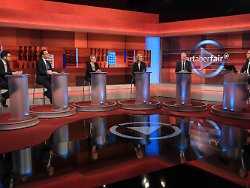Energy prices at Plasberg
Kemfert warns: “We are at war”
By Marko Schlichting
03/22/2022 03:39 am
Petrol prices above two euros are unacceptable to commuters, and there seems to be agreement on this point in large parts of the government and the opposition. So what to do? Finance Minister Lindner defended his “tank discount” idea in “Hard but fair”. Mainly because it can be implemented quickly. However, the energy expert in the group thinks little of that.
Energy prices have already risen significantly in the last year, and since the Russian attack on Ukraine, development has picked up speed again. Nowhere is this more evident than at the gas stations, whose price boards currently show sums far in excess of the two euro mark. How to relieve commuters is the topic of “Hart aber fair” on ARD on Monday evening. Among other things, the idea was raised that reducing the cost of petrol could not only be a societal but also an individual problem.
Spahn for tax cuts
For Jens Spahn, who has been responsible for economic issues at the CDU since the elections, there is a simple solution: “Gasoline must be at least 40 cents cheaper per liter. The easiest way to do that is through taxes.” Spahn calls for “hard but fair” to reduce energy and value added tax on petrol. “All the other suggestions I’ve heard so far are neither quick nor unbureaucratic,” says Spahn.
The chairman of the SPD in North Rhine-Westphalia, Thomas Kutschaty, is against it. Spahn’s suggestion does not meet the right people. It is not clear that the mineral oil companies would return the VAT reduction to consumers. “That’s why we have to find solutions for those who have to drive a lot but only have a low or medium income,” he says.
If you believe Finance Minister Christian Lindner from the FDP, Spahn’s proposal would not be implemented quickly anyway. “Tax measures need legislation,” explains Lindner. In addition, according to current EU law, only little can be saved with diesel. And: “Mr. Spahn’s model is not compatible with the VAT system line as it currently is,” said the Minister of Finance. The European Union must have a say in lowering VAT on petrol, he says. “Now it’s about temporary crisis intervention. If it’s up to me, people can expect relief as soon as possible.” According to Lindner, the traffic light coalition could agree on a new austerity package in the next two days. “Then it can happen very quickly, and it has to.” His coalition colleague Thomas Kutschaty agrees: “We have to relieve people as quickly as possible.”
Lindner sticks to the “tank discount”.
The fuel discounts demanded by Lindner could be included in the coalition’s austerity package, but many experts have criticized them – among other things because those who can afford higher costs are also relieved. “I’m in favor of this discount because, in case of doubt, it can be decided directly by the cabinet without legislation,” says Lindner.
The tank discount is supposed to work like this: The price of petrol does not change, but customers do not have to pay it in full at the petrol station checkout. The operators of the gas station get back the discount that they have granted the customers via the receipt from the tax authorities.
SPD for mobility money
The SPD, on the other hand, advocates a “mobility allowance” that is paid out together with the salary for three months. Employers then offset this against lower wage tax payments. Even Jens Spahn can get something out of this idea, “If it’s fast.” After all, the money can not only be spent on petrol, but also at the supermarket checkout.
Energy expert Claudia Kemfert also thinks the idea is okay, but sees a crucial problem: “We mustn’t forget that we’re at war,” she warns. “Keeping fuel prices down through subsidies is something for oil companies, because then we drive more again. We have to tighten our belts and we have to reduce unnecessary driving.” Her suggestions: speed limits and car-free Sundays, as they already existed in 1973 during the oil crisis. In addition, you could possibly turn the heaters down a little in winter. That would also make us less dependent on Russian oil, says Kemfert.
Even if the show with Frank Plasberg and his guests was not yet able to offer a solution to the current crisis: there were at least approaches to a solution – and the moderator’s almost sibylline statement at the end of the show: “We are in a dilemma.”
